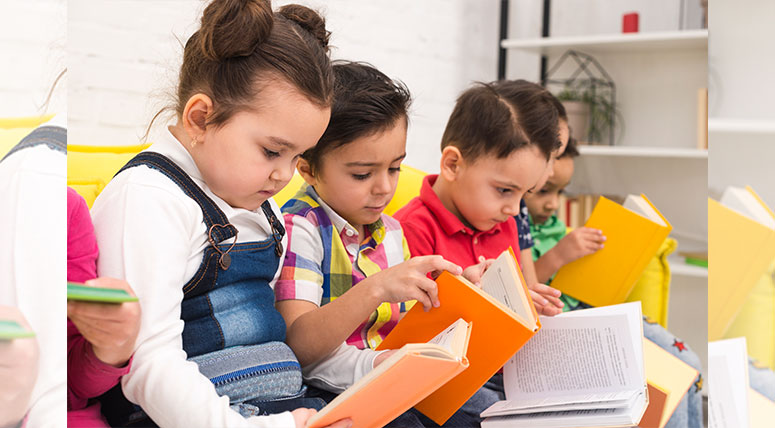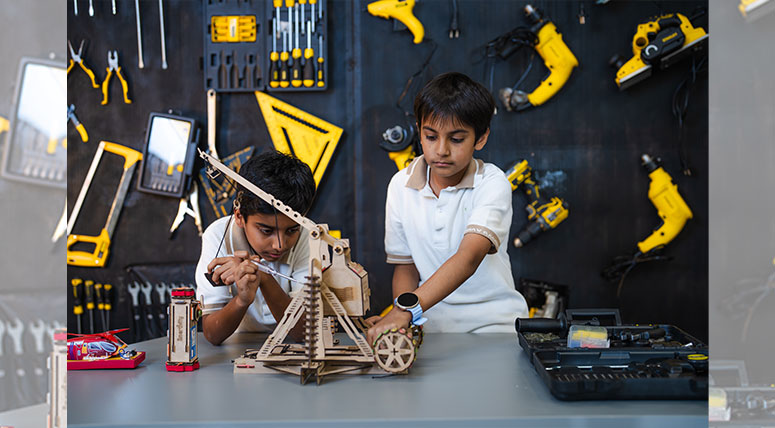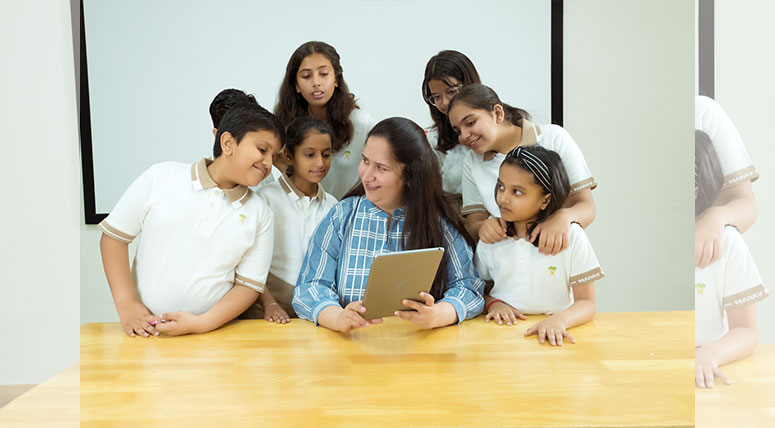THE IB CURRICULUM UNIVERSAL SUCCESS SERIES || CHAPTER 3
The International Baccalaureate Curriculum shapes a learner with futuristic skills and human characteristics. It is one such curriculum that is internationally recognized by the educational bodies. To understand this, let’s read an exclusive, heartfelt post from Ms. Mahima Pathak Lohani, a mother and an IB educator with Manav Rachna IB Candidate School at Sector 14, Faridabad. With teaching experience of around a decade, Ms Mahima here shares her insights around the IB framework.

PERSONAL REVELATION
Back in 2016, we were looking for school admissions for our four-year-old daughter. Though as an educator I was aiming for a learning opportunity to challenge my potential, At the same time, we as a family were quite skeptical in making the right choice for our child. Hence, we became the risk-takers and moved ahead in getting our daughter’s admission to an IB foundation school. After enrolling her we found major differences as compared to many other curricula.
On one hand where CBSE curriculum has a defined syllabus and set pattern of teaching, IB on the other hand advances with the changing trends and gives practical learning experience to the students. There has been a constant debate in the parent community over IB vs. CBSE. In simpler words, opting between the international curriculum and national curriculum. To explain the situation I have mentioned, it is the parents who have the final say as to what will benefit their children.
Manav Rachna International School, IB *Candidate School, Sec-14, through the IB curriculum, let learners have a lively arena to theorize, reason and question what is around them. The school’s teaching method unifies a student-centered approach and a global-vision that aims to create students who can manage dynamic life. The option of parents for IB or CBSE is an individual decision, but Manav Rachna IB curriculum is a suitable course, which develops the necessary competencies and builds the students ‘readiness for the 21 st century challenges.
BUSTING THE MYTHS
- ARE THERE NO TEXT BOOKS?

One of the myths about International Baccalaureate Schools is that it does not have any textbooks.
Well, IB has a plethora of learning resources, which includes reference books pertaining to the concept, library resources, experiential learning like expert sessions, field trips, global connect to understand the multi-dimensional aspect of inquiry. The focus here is more on process than product, so that the students envision future opportunities by being lifelong learners who are self-driven.
- STUDENTS NOT ELIGIBLE FOR COMPETITIVE EXAMS?
Another myth that I came across is that IB students are not eligible for the competitive exams. Though the curriculum focuses on global scenarios, nevertheless there has been a criteria that they are not permissible for the exams. IB curriculum focuses on skill-development from a very early stage. This enhances the cognitive ability of the student to critically analyze any problem posed in front of them. There is a wide range of career paths for the learners as all the disciplines are integral and imperative. The curriculum is well crafted keeping in mind the changing global trends and hands-on learning experiences.
- NO CONTENT PARITY WITH NATIONAL CURRICULUM?
One more myth about IB is in the content parity with the national curriculum. Based on my experience, IB is a meticulously designed framework. The content is aligned with the national curriculum as well as global trends.
In the traditional system, most of the teaching occurs in classrooms and solely follows the prescribed content from books. On the other hand, IB schools believe in providing knowledge based on real-world experience. It is a seamless blend of both practical knowledge and theory. The hands-on learning experience, which, in other words, can be called learning while doing, emphasizes that all the disciplines are pivotal in the overall development of the child.
- DOES IB CURRICULUM FOSTER REAL ENVIRONMENT LEARNING?
IB encourages both educators and learners to expose themselves in the real environment. It, furthermore, not only gives chances to learners to be a part of those unique experiences but also increases their level of interest and creativity. Outdoor learning generates links to the habitat as well as self-reflection on one’s mental and physical wellbeing.

- IMPORTANCE OF THE SCHOOL INFRASTRUCTURE?
For IB curriculum, the school infrastructure plays a vital role in acting as a tool to the learning process. Students these days are addicted to technology, hence learning spaces where there is limited internet access, encourages learners to engage, interact, and reflect with their peers effectively.
- NO FORMAL EXAMS? THEN WHAT TYPES OF ASSESSMENT?
Often it is perceived that there are no formal exams in IB schools. Hence, how would a parent know a child’s progress? IB schools in India harness opportunities for learners to implement their understanding in the real world. The end result here is not just the assessment of conceptual understanding but also the implementation of concepts, skills, learner profile attributes in real life situations. Connecting to the above said, assessment in IB is ongoing and not periodic. Hence, during a lesson, the teacher observes and assesses a child’s class interaction, participation in group activities, time- management and organization skills through work presentations, contribution during class discussions, entry ticket, exit ticket etc. These ongoing assessments are called formative assessments. Thereafter, students and teachers co-construct the final assessment task. To self-assess their performance, they are involved in creating the success criteria.
Let’s Understand The IB Educational Process
Hence, it is evident that their (students and mentors) inputs are imperative in every stage of the educational process. The students’ role is not just as a receiver but they’re an equal contributor in the process. IB educators plan and design learning engagements that can nurture love for inquiry and ignite their thinking skills.
IB philosophy believes in holistic development of a child and not merely focusing on academic achievement. The program entails the training of the learners on how to think morally and act responsively. Here, it is vital to remember that IB develops learners to fit into the VUCA world, the one that is highly volatile, uncertain, complex, and ambiguous.
With the challenges that are seen worldwide, there should be a flexible approach towards learning which is not fixed to any state or local demographic but can be applied globally. IB prepares learners to be future ready. The exposure provided in IB curriculum connects students globally , allowing them to think out of the box.
Learning in IB platform is student centric, and the learner is at the core of the curriculum. It enables the child to be independent and acquire abilities to tackle everyday life challenges.International Baccalaureate School enables the learner to embrace differences, accept challenges, execute sustainable actions and become global citizens. It aids opportunities for learners to become compassionate individuals who can think critically and communicate with effectiveness.
IB education promotes the value of appreciation, acceptance and tolerance by providing ways to work collaboratively. As a result, learners are prepared to deal with the pressing issues and devise an action plan or suggest measures to tackle them. The world is coming closer with each day, thanks to technology. Hence, it is substantial to stay ahead with the changing trends and evolve with changing times. IB prepares learners to be responsible global citizens in this interconnected world. The process of learning is undergoing a fundamental change and IB is the key to that evolution. So, let learning take a leap where focus and joy are the two sides of the coin.
Come join hands in becoming the beacon of change, let learning be free from any inhibitions.
Thank you
ALSO READ: IB PYP: IB PYP: Basking Through Primary Years
ADMISSIONS OPEN FOR IB PYP, MYP & DP AT IB @ MRIS 14, FARIDABAD, GURUGRAM, SESSION 2024-25
AUTHOR: Ms. Mahima Pathak Lohani, IB Educator, Manav Rachna International School, 14
